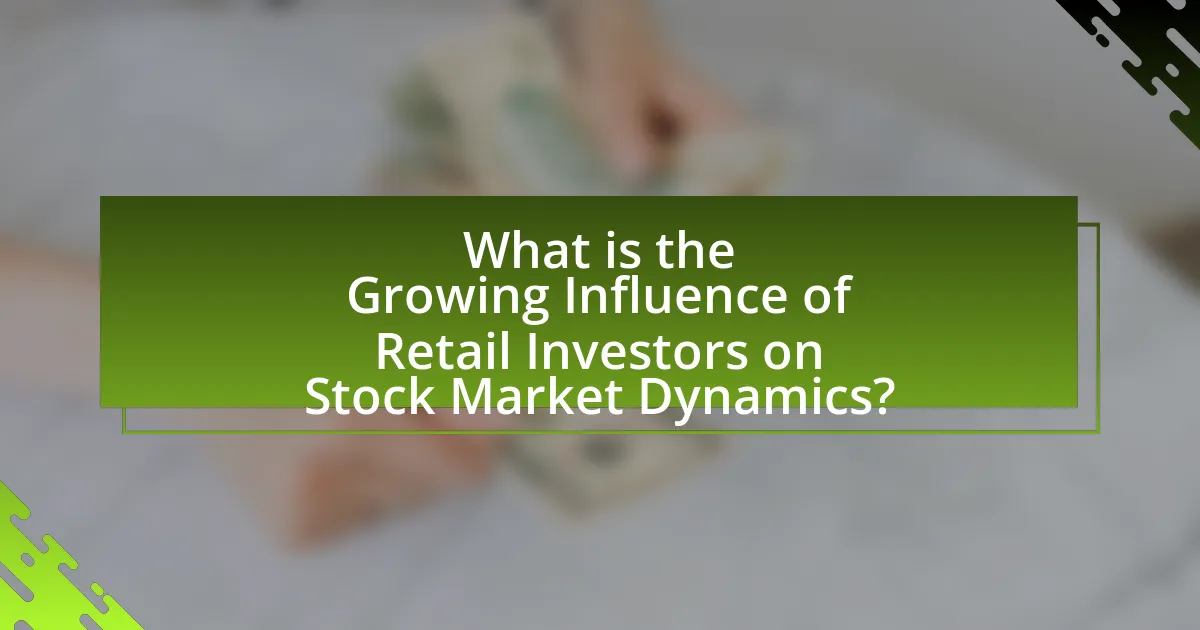The article examines the growing influence of retail investors on stock market dynamics, highlighting their increasing participation and impact on market trends and volatility. It discusses how advancements in technology and the rise of commission-free trading platforms have democratized access to the stock market, enabling retail investors to significantly alter trading patterns. Key events, such as the GameStop short squeeze, illustrate the collective power of retail investors in driving price fluctuations and challenging traditional institutional investors. The article also explores the implications of this shift, including increased market volatility, the role of social media in shaping investor sentiment, and the strategies retail investors can employ to navigate the market effectively.

What is the Growing Influence of Retail Investors on Stock Market Dynamics?
The growing influence of retail investors on stock market dynamics is characterized by their increasing participation and impact on market trends and volatility. Retail investors, empowered by technology and access to information, have significantly altered trading patterns, particularly evident during events like the GameStop short squeeze in early 2021, where retail trading surged and led to substantial price fluctuations. According to a report by the Financial Industry Regulatory Authority (FINRA), retail trading accounted for approximately 25% of total U.S. equity trading volume in 2020, up from around 10% in previous years. This shift indicates that retail investors are not only participating more actively but are also capable of driving market movements, challenging traditional institutional investors’ dominance.
How have retail investors changed the landscape of stock trading?
Retail investors have significantly transformed the landscape of stock trading by increasing market participation and driving volatility. The rise of commission-free trading platforms, such as Robinhood, has democratized access to the stock market, allowing millions of individual investors to trade without incurring traditional brokerage fees. This surge in retail trading activity has been evidenced by a notable increase in trading volumes; for instance, in 2020, retail investors accounted for approximately 20% of total U.S. equity trading volume, up from around 10% in previous years. Additionally, retail investors have influenced stock prices and market trends, as seen in events like the GameStop short squeeze in early 2021, where coordinated buying efforts on social media platforms led to dramatic price increases. This shift has prompted institutional investors to adapt their strategies, recognizing the growing impact of retail sentiment on market dynamics.
What factors have contributed to the rise of retail investors?
The rise of retail investors has been primarily driven by advancements in technology, increased access to information, and the proliferation of commission-free trading platforms. Technology has enabled easy access to trading apps and online brokerage services, allowing individuals to trade stocks with minimal barriers. Increased access to information through social media and financial news has empowered retail investors to make informed decisions. Additionally, the emergence of commission-free trading platforms, such as Robinhood, has eliminated transaction costs, further encouraging participation in the stock market. These factors collectively have transformed retail investing from a niche activity into a significant force in market dynamics.
How do retail investors differ from institutional investors?
Retail investors differ from institutional investors primarily in terms of scale and resources. Retail investors typically manage their own personal funds and trade in smaller amounts, while institutional investors, such as pension funds and mutual funds, manage large pools of capital on behalf of clients. According to a report by the Securities and Exchange Commission, institutional investors account for approximately 70% of trading volume in U.S. equity markets, highlighting their significant influence compared to retail investors. Additionally, institutional investors often have access to advanced research, analytics, and trading technologies, which retail investors may lack, further differentiating their investment strategies and decision-making processes.
What role do technology and social media play in retail investing?
Technology and social media significantly enhance retail investing by providing accessible platforms for trading and information sharing. Retail investors utilize mobile trading apps and online brokerage services, which have surged in popularity; for instance, Robinhood reported over 13 million users by 2021, demonstrating the shift towards technology-driven investing. Social media platforms, particularly Twitter and Reddit, facilitate real-time discussions and community-driven investment strategies, as seen in the GameStop short squeeze in early 2021, where retail investors coordinated through Reddit’s WallStreetBets forum to drive up stock prices. This combination of technology and social media not only democratizes access to financial markets but also amplifies the collective influence of retail investors on stock market dynamics.
How has the accessibility of trading platforms impacted retail investors?
The accessibility of trading platforms has significantly empowered retail investors by providing them with direct access to financial markets. This democratization of trading has led to increased participation from individual investors, as evidenced by the surge in retail trading volumes, which reached approximately 25% of total market activity in 2020, up from around 10% in previous years. Furthermore, the availability of user-friendly interfaces and educational resources has enhanced investors’ ability to make informed decisions, contributing to a more engaged and knowledgeable investor base. This shift has also influenced market dynamics, as retail investors increasingly impact stock price movements and volatility, reflecting their growing importance in the overall market landscape.
What influence do social media platforms have on investment decisions?
Social media platforms significantly influence investment decisions by shaping investor sentiment and facilitating information dissemination. Platforms like Twitter, Reddit, and Facebook allow users to share insights, opinions, and market trends rapidly, which can lead to herd behavior among retail investors. For instance, the GameStop short squeeze in early 2021 exemplified how discussions on Reddit’s WallStreetBets group drove a massive surge in stock prices, demonstrating the power of collective action fueled by social media. Additionally, a study by the University of California, Berkeley, found that social media sentiment can predict stock price movements, indicating that investor decisions are increasingly swayed by online discussions and trends.
What are the implications of retail investors on market volatility?
Retail investors significantly contribute to market volatility by increasing trading volume and creating rapid price fluctuations. Their participation in the market, particularly during events like the GameStop short squeeze in early 2021, demonstrated how collective buying and selling can lead to sharp price movements. Research from the Financial Industry Regulatory Authority (FINRA) indicates that retail trading accounted for approximately 25% of total equity trading volume in 2020, highlighting their growing influence. This influx of retail investors often results in heightened volatility, as their trading behavior can be driven by sentiment and social media trends rather than fundamental analysis, leading to unpredictable market dynamics.
How do retail investors contribute to price fluctuations in stocks?
Retail investors contribute to price fluctuations in stocks primarily through their buying and selling activities, which can create significant demand or supply imbalances. When a large number of retail investors buy a particular stock, it can drive the price up due to increased demand; conversely, widespread selling can lead to price declines as supply outstrips demand. For instance, during the GameStop short squeeze in early 2021, retail investors coordinated their buying efforts through online platforms, resulting in a dramatic price surge from around $20 to nearly $500 within weeks, illustrating their capacity to influence market dynamics significantly. This phenomenon highlights how collective actions of retail investors can lead to volatility in stock prices, affecting overall market stability.
What are the risks associated with increased retail participation in the market?
Increased retail participation in the market poses several risks, including heightened market volatility and the potential for irrational trading behavior. As more retail investors enter the market, their collective actions can lead to significant price swings, as evidenced by events like the GameStop short squeeze in early 2021, where retail trading drove stock prices far beyond fundamental values. Additionally, retail investors often lack the experience and resources of institutional investors, which can result in poor decision-making and increased susceptibility to market manipulation. Research from the Financial Industry Regulatory Authority (FINRA) indicates that inexperienced traders are more likely to engage in speculative trading, further exacerbating market instability.

How do retail investors impact stock market trends?
Retail investors significantly impact stock market trends by influencing price movements and trading volumes. Their collective buying and selling decisions can lead to increased volatility, as seen during events like the GameStop short squeeze in early 2021, where retail investors coordinated on platforms like Reddit to drive up stock prices dramatically. This phenomenon illustrates how retail investors can create trends that deviate from traditional market analysis, as their actions often reflect sentiment rather than fundamentals. Additionally, retail investors contribute to market liquidity, making it easier for larger institutional investors to execute trades.
What trends have emerged due to the growing presence of retail investors?
The growing presence of retail investors has led to several notable trends in the stock market, including increased market volatility, the rise of meme stocks, and a shift towards online trading platforms. Increased market volatility is evidenced by significant price swings in stocks driven by retail trading activity, particularly during events like the GameStop short squeeze in early 2021, where retail investors coordinated on social media to drive up stock prices. The rise of meme stocks, characterized by stocks that gain popularity through social media platforms, highlights how retail investors can influence market dynamics, as seen with companies like AMC and GameStop. Additionally, the shift towards online trading platforms has democratized access to the stock market, with platforms like Robinhood experiencing a surge in user registrations, reflecting a broader trend of retail investors participating in trading activities.
How do retail investors influence stock price movements?
Retail investors influence stock price movements primarily through their collective buying and selling activities, which can create significant demand or supply in the market. When a large number of retail investors buy a particular stock, it can lead to an increase in its price due to heightened demand. For instance, during the GameStop short squeeze in early 2021, retail investors coordinated their buying efforts through social media platforms, resulting in a dramatic price surge from around $20 to nearly $500 within weeks. This phenomenon illustrates how retail investor sentiment and actions can disrupt traditional market dynamics and lead to volatility.
What patterns can be observed in retail investor behavior during market events?
Retail investor behavior during market events often exhibits patterns of increased trading volume, heightened emotional responses, and a tendency to follow trends. During significant market events, such as earnings announcements or economic reports, retail investors frequently react with impulsive buying or selling, driven by fear or excitement. For instance, a study by the Financial Industry Regulatory Authority (FINRA) found that retail trading volume surged by 50% during major market downturns, indicating a reactive approach to market volatility. Additionally, retail investors tend to gravitate towards popular stocks or sectors, often influenced by social media trends, which can lead to herd behavior. This pattern was notably observed during the GameStop short squeeze in early 2021, where retail investors collectively drove up the stock price based on online discussions, demonstrating their significant impact on market dynamics.
What are the potential benefits and drawbacks of retail investor influence?
Retail investor influence can lead to both positive and negative outcomes in stock market dynamics. On the positive side, retail investors can enhance market liquidity and democratize access to investment opportunities, as evidenced by the surge in trading volumes during events like the GameStop short squeeze in early 2021, where retail investors collectively drove stock prices higher, challenging institutional investors. Conversely, the drawbacks include increased market volatility and the potential for irrational trading behavior, which can distort stock prices and lead to significant losses for uninformed investors, as seen in the aftermath of speculative trading frenzies.
How can retail investors drive innovation in the stock market?
Retail investors can drive innovation in the stock market by leveraging technology and social media to access information and collaborate on investment strategies. This democratization of information allows retail investors to challenge traditional market dynamics, as seen in events like the GameStop short squeeze in early 2021, where a collective effort by retail investors on platforms like Reddit led to significant price volatility and market attention. Furthermore, retail investors increasingly utilize trading apps and platforms that offer advanced analytics and real-time data, enabling them to make informed decisions that can influence market trends and encourage companies to adapt to new investor demands.
What challenges do retail investors face in a market dominated by institutions?
Retail investors face significant challenges in a market dominated by institutions, primarily due to the disparity in resources and information access. Institutional investors typically have advanced analytical tools, extensive research capabilities, and faster execution speeds, which allow them to make informed decisions quickly. For instance, according to a 2021 report by the CFA Institute, institutional investors manage over 70% of the total assets in the U.S. equity market, giving them substantial influence over price movements and market trends. This dominance can lead to retail investors experiencing higher volatility and less favorable trading conditions, as institutional trades can impact stock prices significantly. Additionally, retail investors often lack the same level of market insight and may be more susceptible to emotional trading, further exacerbating their challenges in a competitive environment.

What strategies can retail investors employ to navigate the stock market effectively?
Retail investors can employ several strategies to navigate the stock market effectively, including diversification, dollar-cost averaging, and conducting thorough research. Diversification involves spreading investments across various sectors to mitigate risk; for instance, a portfolio that includes technology, healthcare, and consumer goods can reduce the impact of a downturn in any single sector. Dollar-cost averaging allows investors to buy shares at regular intervals, which can lower the average cost per share over time, particularly in volatile markets. Additionally, conducting thorough research, such as analyzing company fundamentals and market trends, enables retail investors to make informed decisions, thereby increasing the likelihood of achieving favorable returns. According to a 2021 report by the Financial Industry Regulatory Authority (FINRA), informed investors are more likely to outperform the market compared to those who do not engage in research.
What best practices should retail investors follow to minimize risks?
Retail investors should diversify their portfolios to minimize risks. Diversification reduces the impact of a poor-performing asset on the overall portfolio by spreading investments across various asset classes, sectors, and geographic regions. According to a study by the CFA Institute, a well-diversified portfolio can significantly lower volatility and enhance returns over time. Additionally, retail investors should conduct thorough research and stay informed about market trends, as informed decision-making leads to better investment choices. Implementing stop-loss orders can also protect against significant losses by automatically selling a security when it reaches a predetermined price. These practices collectively help retail investors manage risks effectively in the stock market.
How can retail investors leverage technology for better decision-making?
Retail investors can leverage technology for better decision-making by utilizing advanced analytical tools and platforms that provide real-time data and insights. These tools, such as algorithmic trading software and mobile trading applications, enable investors to analyze market trends, track stock performance, and execute trades quickly. For instance, platforms like Robinhood and E*TRADE offer features that allow users to access financial news, stock charts, and technical indicators, which enhance their ability to make informed investment choices. Additionally, the use of artificial intelligence in investment apps can help retail investors identify patterns and predict market movements, further improving their decision-making process.
What resources are available for retail investors to enhance their knowledge?
Retail investors can enhance their knowledge through various resources, including online courses, investment platforms, financial news websites, and books. Online courses from platforms like Coursera and Udemy offer structured learning on investment strategies and market analysis. Investment platforms such as Robinhood and E*TRADE provide educational resources and tutorials tailored for beginners. Financial news websites like Bloomberg and CNBC deliver up-to-date market information and expert insights. Additionally, books such as “The Intelligent Investor” by Benjamin Graham and “A Random Walk Down Wall Street” by Burton Malkiel serve as foundational texts that cover essential investment principles and strategies. These resources collectively empower retail investors to make informed decisions in the stock market.
How can retail investors contribute positively to market dynamics?
Retail investors can contribute positively to market dynamics by increasing market liquidity and promoting price discovery. Their participation in the stock market enhances trading volumes, which facilitates smoother transactions and reduces bid-ask spreads. For instance, during the GameStop trading frenzy in early 2021, retail investors significantly increased trading activity, leading to heightened liquidity and a more dynamic market environment. This influx of retail participation can also lead to more accurate pricing of stocks, as diverse opinions and strategies are reflected in market prices.
What role does community engagement play in retail investing?
Community engagement plays a crucial role in retail investing by fostering information sharing and collective decision-making among investors. This engagement enhances the ability of retail investors to access diverse perspectives and insights, which can lead to more informed investment choices. For instance, platforms like Reddit and Discord have become popular for retail investors to discuss stock trends and strategies, significantly impacting market movements. A study by the Financial Industry Regulatory Authority (FINRA) found that retail investors who participate in online communities are more likely to engage in active trading and exhibit higher confidence in their investment decisions. This collective knowledge and support system can amplify the influence of retail investors on stock market dynamics, as seen during events like the GameStop short squeeze in early 2021, where community-driven efforts led to substantial price volatility.
How can retail investors advocate for fair market practices?
Retail investors can advocate for fair market practices by actively participating in shareholder meetings and voting on corporate governance issues. Engaging in these activities allows retail investors to influence company policies and promote transparency. Additionally, they can join or support organizations that focus on investor rights and market fairness, such as the Investor Advocacy Clinic or the Better Markets organization. These groups work to ensure that regulatory frameworks protect all investors, not just institutional ones. By leveraging social media platforms, retail investors can raise awareness about unfair practices and mobilize collective action, as seen during the GameStop trading events in early 2021, which highlighted the power of retail investors in challenging market dynamics.



